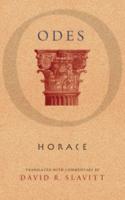
Wisconsin (2014) p/b 184pp £10.50 (ISBN 978029854 8)
In his introduction to The Penguin Book of Modern Verse Translation, George Steiner refers to Borges’ story of a man toiling his life away translating Don Quixote into the original Spanish. We all know that complete translation is an impossibility, and that a mode of expression as unique as a poem just adds to the difficulties. This is why the reader needs to know what the translator is trying to achieve with his or her approximation.
Slavitt has no doubt about his job, and reveals in his brief notes the additions, subtractions and changes he made ‘to get to what I believe Horace wrote’: so no historical and literary notes to align the English with the Latin. What readers get are the poems on the page, and no more, to render an Horatian experience. He hopes that his versions will speak particularly to the virginibus puerisque who don’t get the chance to learn Latin, but who are curious. The continuous decision-making process for the translator happens, says S., between a rock and a hard place. His versions, then, are vividly clear, and usually won’t need a second reading to understand what’s going on—the cultured Epicurean loving his rural estate, the company of his friends¸ and the freedom from pain he might expect from Augustus’ vision of a settled Rome.
It is instructive to compare S. with David West’s approach in his Odes III (Oxford). In W.’s foreword we read, ‘The purpose of this book is to explain the Latin and suggest how the poetry works’. To achieve this W. must tell us who’s who, the historical and social setting of the ode, and debts to earlier writers. These are poems of praise, a rare genre these days (laureates excepted), and we have, with W.’s help, some work to do to fully understand them.
S.’s translations reduce the conceptual distance between poem and reader as far as he can, whereas West cherishes that distance, seeing it as an opportunity for the reader to understand the whole context that will render up the deep meaning of the poem. S. is for the ‘naïve’ reader, W. for the interested/committed learner who wants to know more about what Horace was thinking about at the time.
So in the one (III 18), we get:
‘O Faunus, randy runner after the nymphs,
Come gently to grace my sunny bit of land….’
In the other:
‘Faunus, lover of fleeing nymphs,
Come gently over my borders and my sunny fields…..’
Again (III.1), compare:
‘Why would I ever think about big houses
With imposing doorways impressing the passerby?
I have my Sabine farm
Where I can be carefree.’
With:
‘Why should I raise a lofty entrance hall
in a new style with doorposts for all to envy?
Why should I give up my Sabine farm
For riches which bring more labour?’
W. and S., of course, are addressing virginibus puerisque of different experiences and needs, and one audience might prefer, for instance, ‘randy runner after the nymphs’ to ‘lover of the fleeing nymphs’.
Most of S.’s versions seem to me to hit the mark, and perhaps to compensate those who had no chance to learn Latin. Get some in as charming gifts to interested friends.
Adrian Spooner
